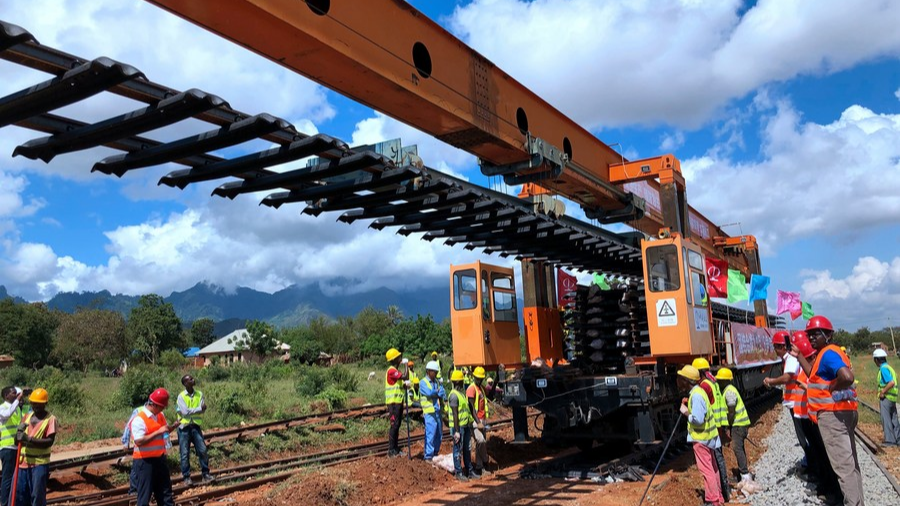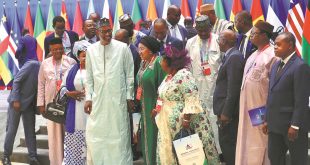Published: April 28,2024
By Li Yujie

Staff members work at a site of Tanzania’s Central Railway Line rehabilitation project undertaken by China Civil Engineering Construction Corporation in Tanzania, April 15, 2019. /Xinhua
This year marks the 60th anniversary of the establishment of diplomatic relations between China and Tanzania. After six decades of sincere cooperation, the friendship between the two countries is even deeper, and practical cooperation has yielded fruitful results, which have truly benefited the two peoples.
For China, Tanzania has a special status. The world-famous Tanzania-Zambia Railway is a monument symbolizing the friendship between China and Tanzania, that not only carries the common beautiful memories of the two peoples, but also the spirit of mutual respect, tenacious struggle and selfless dedication. It contains the inexhaustible driving force for the prosperous development of cooperation between the two sides, pushing China-Tanzania relations to always be at the forefront of China-Africa cooperation while becoming a model for South-South cooperation.
Under the guidance of their heads of state, China and Tanzania have maintained the momentum of high-level exchanges, strengthened strategic coordination, closely cooperated in international and regional affairs, and effectively safeguarded the legitimate development interests of developing countries. The principles of China’s Africa policy – “sincerity, real results, amity and good faith” – first advocated by Chinese President Xi Jinping during his visit to Tanzania in 2013, has now become the basic policy guiding China’s unity and cooperation with developing countries.
The visit of Tanzanian President Samia Suluhu Hassan to China in 2022 was another highlight in Sino-Tanzanian relations. President Xi Jinping and President Hassan jointly announced that they would upgrade the relationship between the two countries to a comprehensive strategic cooperative partnership, pushing the relationship between the two countries to a new high.
Tanzania is one of the fastest growing economies in Africa. Over the past 60 years, cooperation between China and Tanzania has covered many fields such as economy and trade, infrastructure, agriculture, medical and health, and has achieved remarkable results. China has remained Tanzania’s largest trading partner for eight consecutive years. In 2023, bilateral trade volume reached $8.78 billion, a year-on-year increase of 5.66 percent. China is also Tanzania’s largest source of foreign investment, with a total of around 260 investment projects in the East African country.
The Ubungo Interchange under construction by China Civil Engineering Construction Corporation (CCECC), in Dar esSalaam, Tanzania. /Xinhua
In recent years, China and Tanzania have promoted high-quality joint construction of the Belt and Road Initiative. Chinese companies have built a series of local infrastructure projects such as ports, bridges, and railways, making outstanding contributions to the development of Tanzania. Among them, the UbungoInterchange, the Magufuli Bridge, and water supply for satellite cities in Mwanza region are representative projects.
The Ubungo Interchange is one of the most important transportation hubs in Dar es Salaam, the capital of Tanzania. It is also the country’s first multi-span and multi-story overpass project. It has been opened to traffic since 2020. As a landmark project in Tanzania, its completion is of great significance.
The Magufuli Bridge is an important inland international passage in Tanzania, with a total length of 3.2 kilometers. When completed later this year, it will become the longest short-tower cable-stayed bridge in Africa, and will significantly improve local traffic conditions and promote the economic development of surrounding areas.
The water supply project for satellite cities in Mwanzaregion is another important livelihood development under the Belt and Road Initiative. Since it was put into operation in 2019, the project has solved the water problem for about 150,000 local citizens, reducing water costs to one-fifth of the original, and providing more employment opportunities for local people.
The achievements of China-Tanzania cooperation are not only reflected in the economic and trade fields, but the achievements in people-to-people and cultural exchanges are also impressive. The two countries have signed agreements in health, education, culture, tourism and other fields. Sixty years ago, China sent the first batch of medical teams to Zanzibar Island. Currently, a total of 60 Chinese medical teams are providing medical services to the mainland and Zanzibar. Chinese medical teams have traveled all over Tanzania, writing a touching chapter of China-Tanzania friendship.
In 2015, the first cultural center in East Africa was established in Tanzania, and the “Chinese language craze” continues apace in Tanzania. The Confucius Institute, Confucius Classroom, and Luban Workshop have taken root in Tanzania, cultivating a large number of language and technical talents that adapt to local needs. Tanzania is a tourist destination for Chinese citizens, with increasing numbers of them visiting Tanzania to experience its beautiful scenery. China and Tanzania have frequent local exchanges at all levels, and there are currently five pairs of sister provinces and cities. During the exchanges, the people have become more connected.
Looking back on the 60 years of China-Tanzania relations, it has been six decades of sharing joy and sorrow, helping each other, and developing together. Currently, both countries are standing at a new historical starting point and are facing new important opportunities. Under the great changes unseen in a century, China and Tanzania need unity and cooperation more than ever. Sino-Tanzanian relations, which have gone through decades of international changes and trials, will continue to open a new chapter in the spirit of the Tanzania-Zambia Railway and push bilateral cooperation to a higher level.
Li Yujie, a special commentator on current affairs for CGTN, is an associate researcher at the Institute of West Asian and African Studies, Chinese Academy of Social Sciences.
cgtn.com
 Africa -China Review Africa -China Cooperation and Transformation
Africa -China Review Africa -China Cooperation and Transformation
